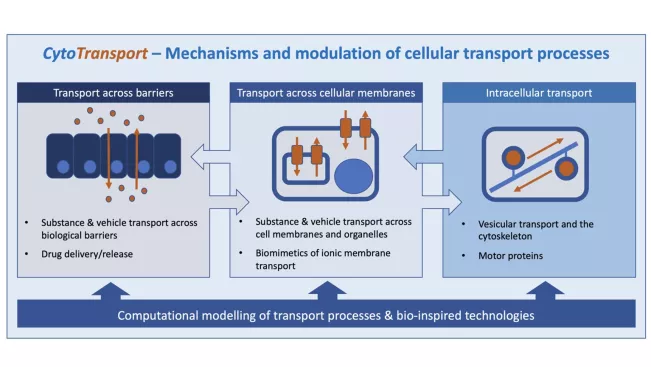Forschungsimpuls – CytoTransport
Research Focus and Aims
Substance transport in organisms occurs at different levels, including transport across epithelial barriers, cell and organelle membranes via ion channels and transporters as well as intracellularly. Impaired transport processes are associated with major human diseases, such as lung diseases, hypertension or metabolic and immune system diseases. Therefore, the understanding of these mechanisms and the modulation of cellular transport processes is crucial for the development of new therapeutic strategies and a worthwhile goal to promote human health. The proteins involved in transport processes are therefore highly relevant targets for pharmacological research. In addition to the development of specific modulators for these proteins, it is important to develop suitable vehicles for transport modulators. The development of small molecule modulators and transport vehicles creates a solid basis for effective and targeted therapies.

As part of the research impulse, we bring together expertise from biomedicine, computational modeling, structural biology, chemistry and materials science to investigate cellular transport mechanisms at different scales of resolution - from atoms and molecules to single cells and tissues. A particular focus is on molecular interactions, including structure-function analyses. Detailed knowledge of such interactions is necessary to develop and improve transport modulators, both as a basis for efficient research tools and therapies and for exploring the functional consequences of gene variants in transport proteins or their regulators. Detailed and dynamic structure-function analyses of transport proteins with atomic resolution using computer-aided modeling complement experimental research. They enable the targeted refinement of transport modulators and vehicles as well as the transfer of knowledge about biological transport mechanisms to artificial membrane transport technologies.
Analytical approaches such as these will shape the future of biomedical research, especially in the era of personalized medicine, where modern gene sequencing techniques have become routine. Personalized medicine will not only investigate the functional effects of gene variants, for example in ion channels/transporters, and their role in disease mechanisms, but also predict drug response based on altered molecular interactions with components of the transport machinery or uptake pathways. Our multidisciplinary consortium will investigate prototypical ion channels/transporters and establish diverse workflows, assays and new methods that are transferable to many other transport systems. In the long term, we will thus be able to thoroughly investigate transport-related questions in the era of personalized medicine.